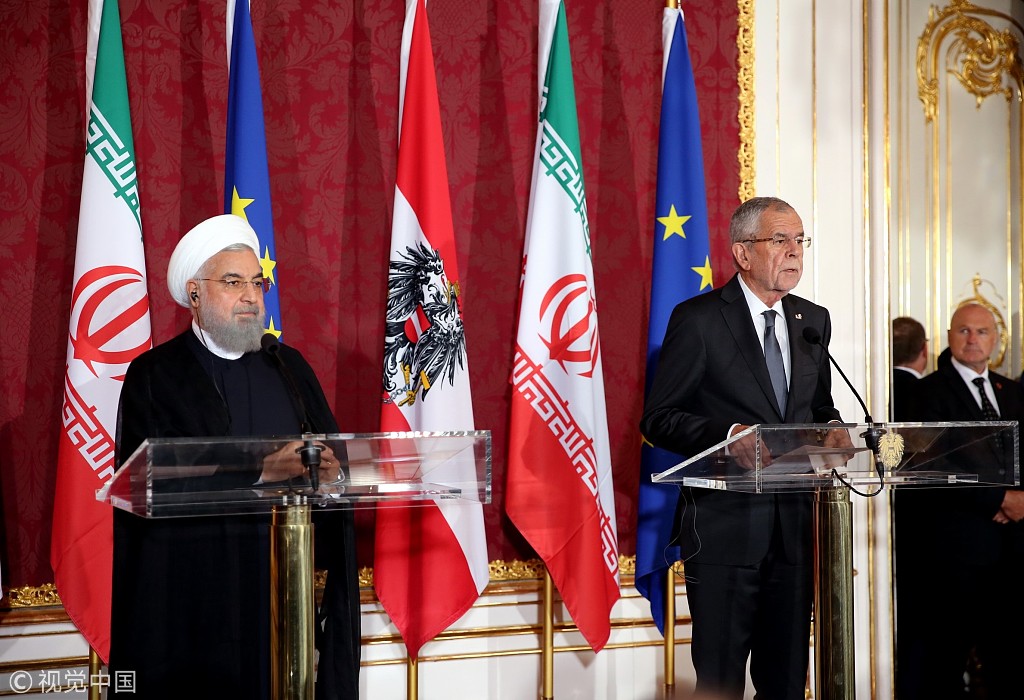
President Hassan Rouhani (L) and Austrian President Alexander Van der Bellen (R) hold a joint press conference following their meeting at the Hofburg Palace in Vienna, Austria for an official visit on July 04, 2018. [Photo/VCG]
Iranian President Hassan Rouhani's meeting with Austrian President Alexander Van der Bellen on Wednesday is being hailed by European analysts as "critical" in saving a landmark nuclear deal signed in the Austrian capital in 2015, which risks falling apart after the withdrawal of the United States in May.
Austria has just assumed the rotating European Union presidency, and Rouhani expects Van der Bellen to present Iran with an incentive package, giving it concrete guarantees to benefit from staying in the 2015 Joint Comprehensive Plan of Action, known as JCPOA.
That deal, signed by Iran, China, France, Russia, United Kingdom, the US and Germany, capped Iran's most sensitive nuclear work in return for the lifting of many sanctions.
But it was plunged into crisis in May this year by US President Donald Trump's decision to withdraw his county from it.
Meanwhile, China's State Councilor and Foreign Minister Wang Yi will attend the foreign ministers' meeting on Iran nuclear issue on Friday in Vienna, the Foreign Ministry said on Wednesday.
Ministry spokesman Lu Kang said China always believes that the deal is a significant achievement of multilateralism, and plays an important role in upholding the international non-proliferation regime as well as promoting peace and stability in the Middle East.
"Wang's participation shows China's clear stance to preserve the Iran nuclear deal," he added.
Christopher Bovis, a professor at University of Hull, said: "Austria will stress the importance of Iran sticking to the latter and spirit of JCPOA, despite the unilateral withdrawal of the US from that agreement."
"The visit will determine the commitment of Iran to nuclear weapons abandonment. However, if the EU fails to provide the appropriate of economic guarantees in order for Teheran to continue its commitments, Iran will restart nuclear activities," Bovis said.
Immediately before arriving in Austria, Rouhani made a visit to Switzerland. Speaking alongside president of the Swiss Confederation, Alain Berset, on Tuesday, Rouhani said Iran is "committed" to promises made in terms of the JCPOA.
The timing of this week's discussions on JCPOA is critical because Trump said the US will begin re-imposing sanctions on Iran on Aug 6.
Trump had said that the US was pulling out because the accord failed to prevent Iran from developing nuclear weapons.
Obama's policies
Sanam Vakil, associate fellow in Middle East and North Africa program at the London-based think tank Chatham House, said the US is trying to pressure Iran to address issues in the Middle East, with regards to Syria, Lebanon and Yemen.
Vakil said tension between Trump and former US president Barack Obama, who signed up to the deal, had also influenced Trump's decision to pull out from the deal, as Trump "often overturn policies agreed under Obama".
Vakil said the outcome of the meeting in Austria is highly dependent on the details of the incentive package which the EU presents to Iran, adding that Iran's key demands are to secure smooth financial transaction channels and oil export capabilities, which are core support for its economy.
"It is doubtful that what the EU offers will be enough for Iran, but it will help the Iran maintain a life support while it weighs its options over the Middle Eastern issues," Vakil said.


